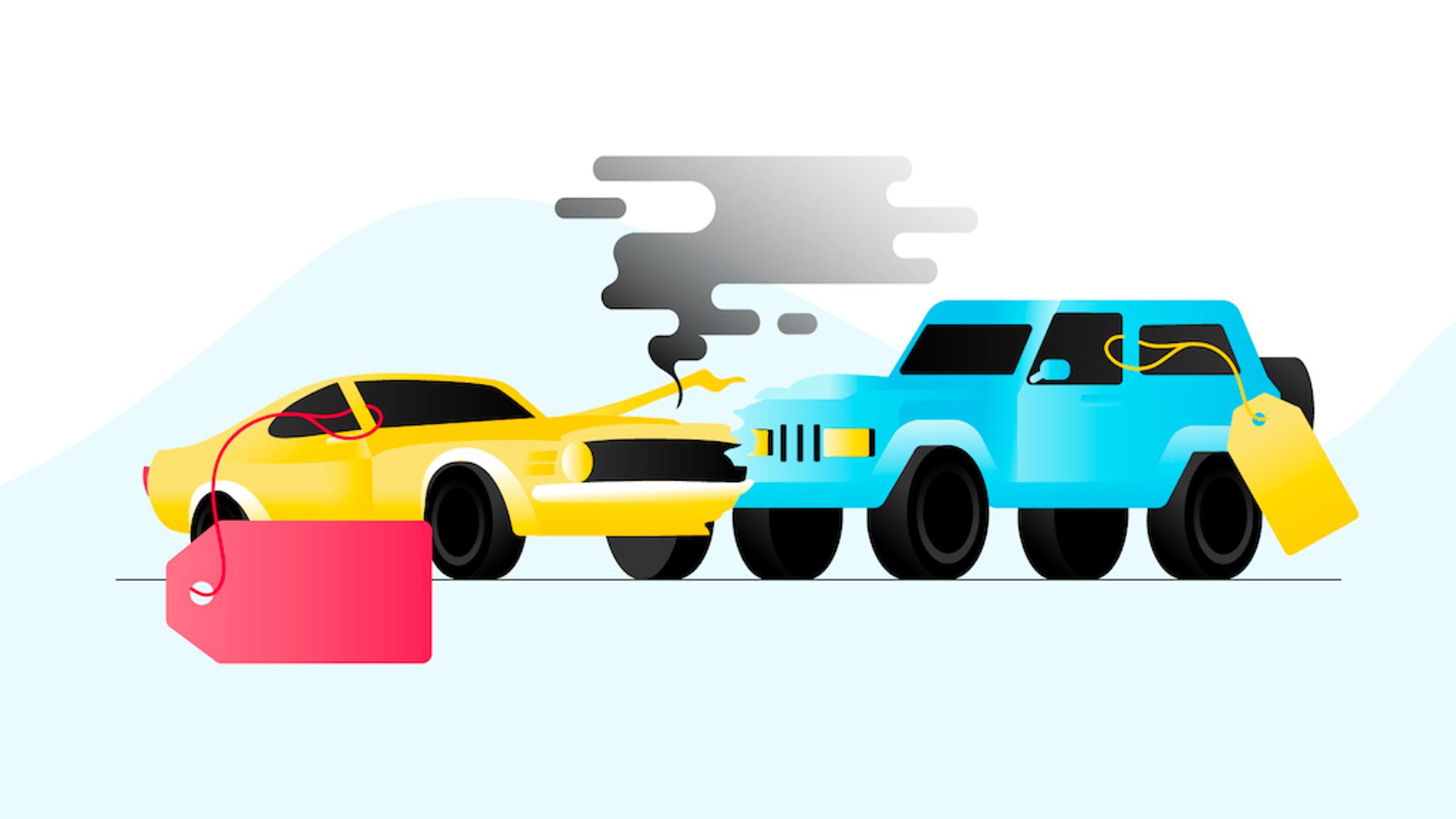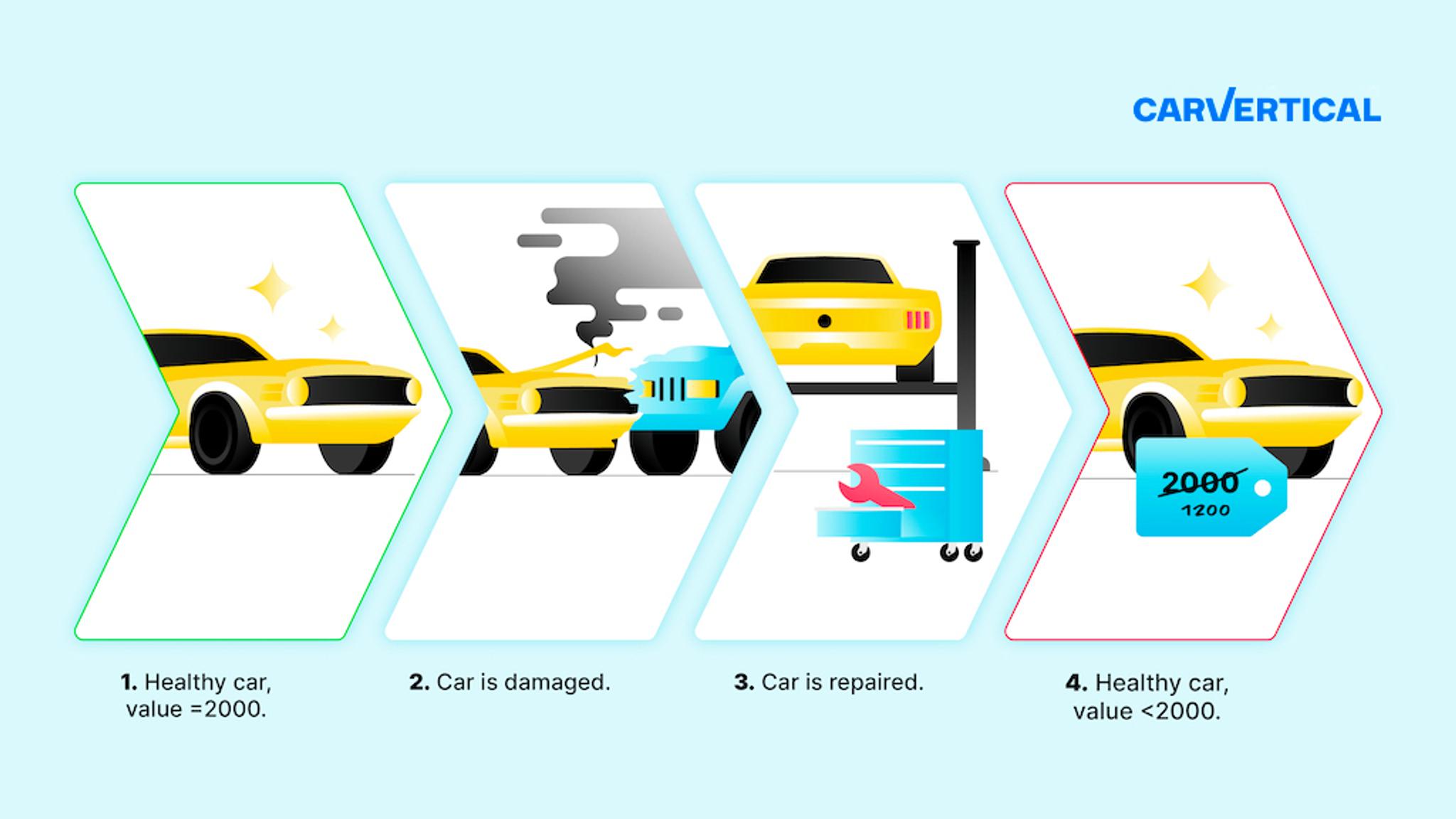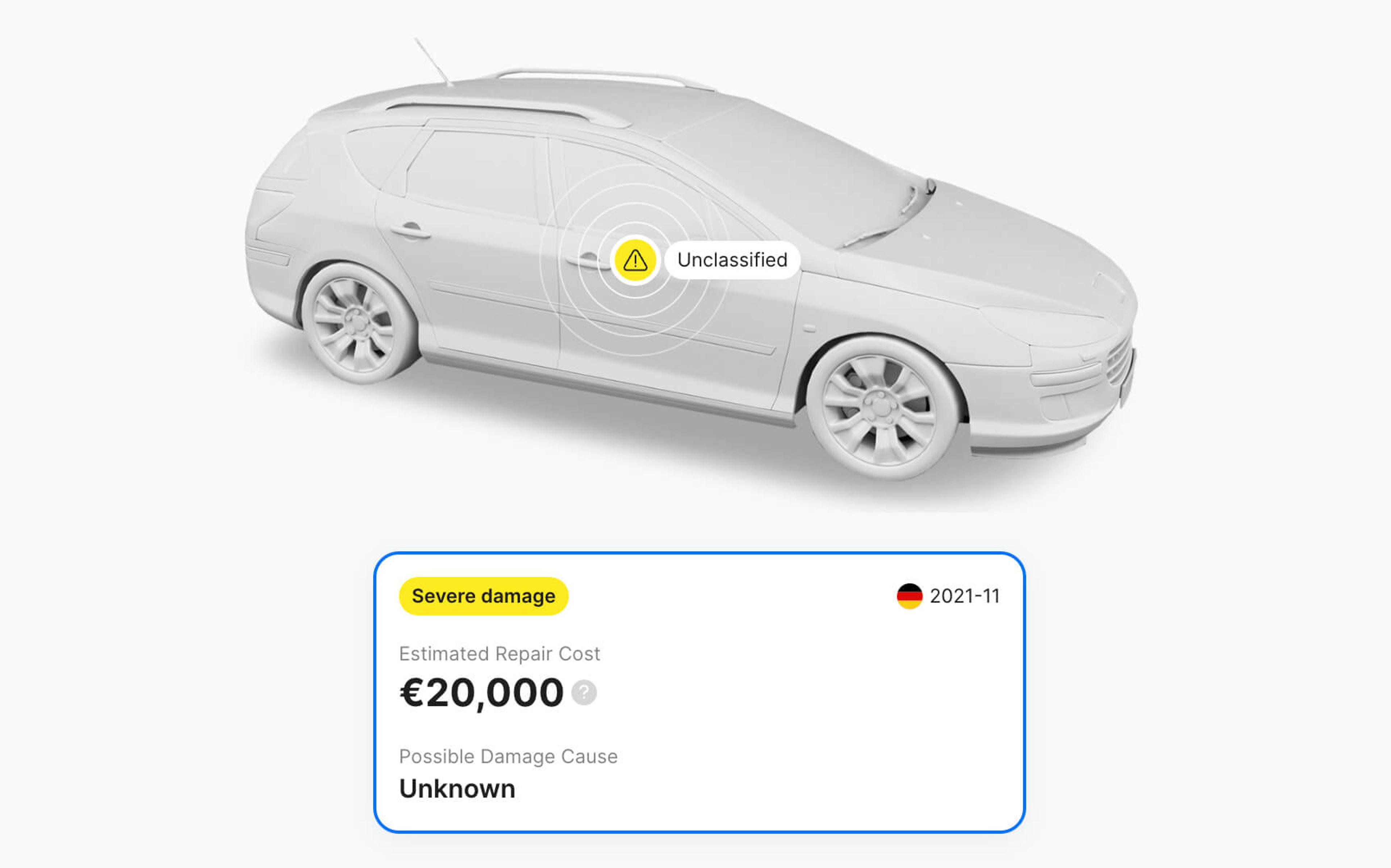
People looking for a used car often end up buying a damaged one. In fact, over the past year, 41.5% of all cars checked by carVertical had been damaged to some degree.
These cars may seem like a great deal because they're often new and desirable models that are priced significantly below the standard market rate. However, buyers rarely realize just how much an accident devalues a car. As a result, they often end up buying vehicles that are not only unsafe but also impossible to sell.
In short, accidents devalue cars a lot – the drop in value can be significantly bigger than the repair costs. Let's look at some of the reasons.

Need help buying a used car?
Enter a VIN code to learn more about any vehicle!
Accident history – a key factor in determining the liquidity of a car
Despite what many people assume, repair costs are just a tiny fraction of the impact car accidents have on the value of a vehicle. In reality, there are a lot of "hidden costs" that can make a perfectly good car almost impossible to sell at a decent price.

The main reason for this is the psychology of the marketplace. Buyers on the used car market are suspicious of sellers, and a damage record will only raise those suspicions.
As such, when buying a used car, people should imagine themselves selling it in a couple of years. How easy will it be?
Well, if your car is damaged, here are 3 reasons why selling it shouldn't be easy.
1. You don't know what was damaged and how badly
The main reason used cars cost less than new ones is natural wear and tear, poor maintenance, and accidents. When the car is damaged in a big accident, you'll often end up spending more money on maintenance, and you'll also have to find and fix issues to prevent them from progressing.
Some cars survive accidents with a few scratches on a bumper, but during harder impacts, a car's structure may get damaged. In that case, the structure deforms and loses its rigidity, often also damaging the powertrain.
Essentially, a damaged structure will make a car more likely to break down in the future, and these costs are something a potential buyer will (and should) take into account when buying a damaged car.
Here's the issue: it's practically impossible to predict how much the maintenance of such a car will cost in the future. As a result, the value falls significantly, and some buyers may ignore badly damaged cars altogether.
Car history reports reveal which parts of the car were damaged and how much the repairs cost. You can assume that the car got more than a scratch when repair expenses reach five figures.

2. It's unclear how well the damage was repaired
Almost all car damage can be repaired, but since most sellers want the maximum profit, they often choose the cheapest solutions. They may fix the body panels using plastic zip ties and cover dents with thick layers of putty underneath the paint. Here are some of the most common examples of shoddy repairs:
- Missing airbags. Replacing a single airbag may cost over a thousand dollars. Some sellers install bypass resistors to disable the airbag light on the dash, making the car extremely unsafe to drive.
- Damaged panels aren't replaced. Sometimes sellers even out bent body panels with putty instead of replacing them, which leads to safety concerns and premature corrosion.
- Flood corrosion. Flooded cars must be thoroughly dried and cleaned after a flood to prevent corrosion inside electrical connectors and control units.
- Structural damages aren't repaired. Bent pillars, strut towers, and other structural parts must be replaced or straightened out in less severe cases.
- Poor quality paint job. Steel body parts must be covered in multiple base and paint coats to avoid premature corrosion or sun damage.
The average driver won't know how to spot these issues and should get the car checked by a professional before buying. Mechanics, electricians, and body shop workers know the tricks and ways to evaluate the risks.
With that said, even getting your vehicle to a professional doesn't guarantee you'll find out about all the cut corners during the repair process. Many buyers know this and are therefore more suspicious of damaged cars.
In the end, the only surefire way to sell a car for good money is to avoid buying one with significant damages in the first place.
3. Badly damaged cars are hard to insure
If you didn't check your car's history before buying it – your insurance company will. Previously damaged cars raise more safety concerns because they are more likely to break down and get into an accident. Also, cars with structural damages are less rigid, meaning their repair costs can be higher after the following car accident.
If you buy a badly damaged car, you may find out the hard way that it's very difficult or expensive to insure. This is especially true if it has a salvage title in another state or country. Insurance companies won't give you a deal if their calculations show that potential repair costs could exceed the car's resale value, or if they would stand to lose too much money by covering these expenses.
And guess what – if you try to sell a car you've found difficult to insure, potential buyers may not give you a great deal on it either!
The growing popularity of car history checks will make damaged cars harder to sell in the future
Used car sellers have been scamming gullible buyers for years by faking mileage readings and hiding damages. Fortunately, buyers can avoid scams by getting a vehicle history report, revealing badly damaged cars.
This means you can avoid getting a difficult car to sell by checking its history. However, if you already have one – bad news! Vehicle history reports are growing in popularity, making damaged cars even more difficult to sell in the future.

You've damaged your car – how do you minimize losses?
People avoid damaged cars because of additional expenses and safety-related issues. They only want to pay a full market price for problem-free vehicles without historical damage records. They're also hoping for a bargain after seeing damage records in a vehicle history report.
You should get decent money for a previously damaged vehicle if it's been repaired properly after a car accident. Just make sure to save these repair bills because buyers will ask for proof.
Also, some insurance companies offer a diminished value claim to cover for a vehicle's market value difference due to damage records in the car's history. If your insurance company offers a diminished value claim and the value of your car drops by, let's say, $1,000 even after repairing the damages – the insurer will cover that difference.
Finally, when selling a damaged car, it's best to come clean. Get your own car history report and explain to your buyer what was damaged, how it was repaired, and any other important details. While you will still get less than for a healthy car, the losses should be smaller.

Check your registration number
Avoid costly problems by checking a vehicle's history. Get a report instantly!
Frequently asked questions

Article by
Tadas Švenčionis
Tadas is the Editor in Chief of the carVertical Blog. A fan of all things automotive and tech, he makes a point of making complex topics simple and engaging – after all, what good is a story no one understands? Tadas spends his free days reading, gaming, and bringing music no one’s asked for to Vilnius, Lithuania.
